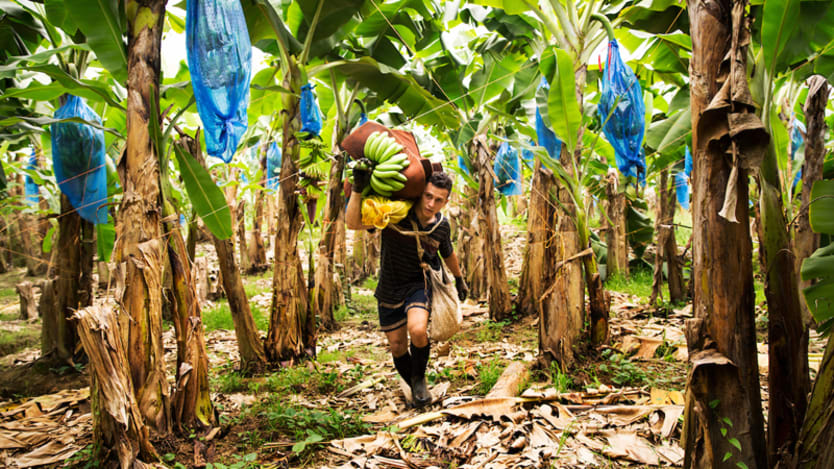
The banana is the world’s most popular fruit crop. In fact, globally we eat a mammoth 100 billion bananas every year.* According to the Food and Agriculture Organization, the fruit is the developing world’s fourth most important food crop, and an essential source of income and nutrition for millions of smallholder farmers. However, its future is in jeopardy. A parasite coined the “hidden enemy,” is threatening the availability of bananas on a global scale.
These microscopic nematodes, colorless in nature and less than 1 millimeter long, penetrate the roots of banana plants by the thousands, draining them of the water and nutrients needed for survival. Infestations result in inexorable damage to the plants’ root structures, which then begin to decay, opening the door for fungi and bacteria to enter the plant and wipe out the entire crop.
“Facilitating access to effective crop protection products is vital to allowing farmers to feed a rapidly growing population. By harnessing scientific advancements we will be able to re-address the balance between global demand and food production.”
— Will Surman, director of communications, CropLife InternationalFor Costa Rica, the world’s third largest banana exporter, this “hidden enemy” is a major threat — apart from being a major export earner for the nation, the fruit is responsible for over 100,000 jobs.
Gil De Diego Salas, director of Calinda Farm, employs 210 staff and exports 20 million kilograms of bananas annually. He has experienced firsthand the level of damage nematodes can inflict on banana crops. “They attack the roots of the banana plant, which means that the plant doesn’t receive the water and micronutrients essential for a good crop. If it gets badly infested, the plant has no way of holding onto the ground and we lose everything,” he said.
Given its importance both domestically and globally, plant scientists like Rodolfo Ceciliano Solis, from Bayer CropScience, have been working to develop a crop protection product to help control the nematode.
“I would say 90-95 percent of bananas in Costa Rica have a nematode problem,” Solis said. “Even in new areas, with no infestation, within five to seven years the plantation will become contaminated.”

However, Solis and his team have been working to tackle this, and in 2009 they made a pioneering discovery. While initially trialing a fungicide to treat banana leaves for a disease called Black Sigatoka, they noted that the product was improving the health of the crop stem.*
See more related topics:
► Food heroes: What it will take to achieve zero hunger
► PPPs: Planting the seeds of prosperity for Bangladeshi farmers
“I asked my assistant to make a root sampling and he showed me the roots had become completely healthy. I had never seen anything like that,” he said. A further examination under the microscope brought the team confirmation — the product was not only improving root health, but also reducing nematode populations. “Importantly, the substance does not enter the leaves or the fruit, meaning we can directly target the pests in the roots of the crop to maximize safety.”
Given corn, soy, cotton and a variety of other vegetables are also affected by nematode infestations, Solis’ work could provide wide-reaching benefits.
“My job is to develop science for a better life, to provide technologies to help farmers produce more, so I was really proud to make a discovery that could benefit global food security,” he said.
Since this discovery, farm director Salas has seen signs of recovery on his banana plantation. “We have done one or two applications starting at the end of last year and have seen more healthy roots. Since I have more roots, I expect more fruits for the coming years.”
Facilitating access to effective crop protection products is vital to allowing Food Heroes such as Salas to feed a rapidly growing population. By harnessing scientific advancements, we will be able to re-address the balance between global demand and food production.
* Update, July 26, 2017: This article has been updated to clarify that global consumption of bananas is some 100 billion pieces of the fruit every year, and that Black Sigatoka is a leaf spot disease.
We are looking for more farmers and scientists to tell their story. Help us uncover the men and women that are securing food supplies for future generations so we can share their story. Submit your Food Heroes’ stories or your own story here.
